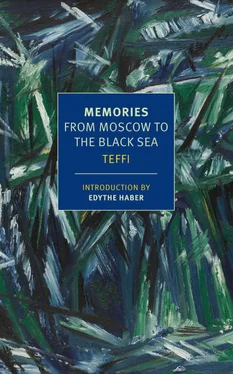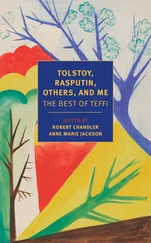It seems clearer and clearer that I have to go. Everyone wants to leave. And if someone isn’t struggling to obtain the necessary permits, since they know they’ve got no hope of success, this doesn’t stop them from dreaming. While those who remain hopeful are suddenly discovering that they have Ukrainian blood, Ukrainian connections, and ties of every kind.
“My third cousin had a house in Poltava!”
“And my surname, strictly speaking, isn’t Nefedin, but Nekhvedin—from Khvedko, which is a Ukrainian root.”
“There’s nothing I love more than fatback and onion!” [3] Fatback ( salo )—the layer of hard fat under the skin of a pig’s back—is considered a delicacy in many parts of eastern Europe. Fatback, onion, and horilka (the Ukrainian equivalent of vodka) is a classic Ukrainian dish.
“Popova’s already in Kiev. So are the Ruchkins, the Melzons, the Kokins, the Pupins, the Fiks, and the Shpruks. [4] Some of these names sound Russian, some Jewish, some German, but none sound Ukrainian. All sound funny. “Koka” is a vulgar form of “krestnaya” (godmother); “Pupin” evokes the Russian word for the belly button; “Fik” and “Shpruk,” especially in the plural, sound equally odd.
Everyone’s already in Kiev.”
And then Gooskin begins to prove his worth:
“Tomorrow at three I’ll be bringing you a commissar—the most terrible commissar of all from the frontiermost station of all. A wild beast of a commissar. He’s just stripped the whole of the Bat. Stripped them bare—didn’t leave them a thing.” [5] The Bat was a theater-cabaret in Moscow, founded in 1908 by actors from the Moscow Arts Theatre. It closed in 1920 but later reopened in Paris.
“But if they even strip bats, what hope have we got of slipping through?”
“That’s why I’m asking him round. Just say a few pleasantries to him and ask for a permit. And then in the evening I’ll take him to the theater.”
And so I begin the application procedures. First in some institution to do with theatrical matters. A languid lady with a Cléo de Mérode hairdo [6] Cléo de Mérode (1875–1966) was a French dancer of the Belle Époque. Born to a Belgian family of nobility, she made her professional debut at the age of eleven. Postcards and playing cards bore pictures of her, and one of her hairstyles became hugely popular.
adorned with a shabby copper band and liberally sprinkled with dandruff grants me permission to go on a reading tour.
Then long, long hours in an endless line in some place that’s like a cross between an army barrack and a large prison. Finally a soldier with a bayonet takes my document from me and goes off to show it to his superior. Then a door is flung open—and out comes the superior himself. Who he is I don’t know. I can only say that, in the language of the time, he is “draped in bullet belts.”
“So you’re Teffi, are you?”
“Yes,” I confess. (There is, after all, no getting away from this.)
“The writer?”
I give a silent nod. He’s going to say no. Why else would he have emerged so suddenly?
“Would you mind just writing your name in this notebook? That’s right. With the date and the year.”
I write with a trembling hand. First I forget the date, then the year. I am rescued by a frightened whisper from someone behind me.
“So,” the superior repeats somberly. He frowns. He reads what I have written. And then his stern mouth slides into a warm and confidential smile: “You see… I wanted your autograph.”
“You flatter me!”
I receive my permit.
Gooskin now further proves his worth. He brings the commissar along. The commissar is indeed terrible. Not a human being, but a nose in boots. There are creatures called cephalopods. Well, he is a rhinopod. A vast nose, to which are attached two legs. One leg, evidently, contains the heart, while the other contains the digestive tract. And these legs are encased in yellow lace-up boots that go right up to his thighs. These boots clearly mean a great deal to the commissar. He is very proud of them and they are, therefore, his weak spot. There indeed lies his Achilles heel. And so the serpent prepares to strike.
“I hear you are a lover of the arts,” I begin my oblique approach. And then, with sudden feminine naïveté, as if unable to control myself, I exclaim, “Ah, what wonderful boots!”
The nose blushes and puffs itself up a little.
“Hem… the Arts… I adore the theater, although I have seldom had the opportunity—”
“What astonishing boots! Truly the boots of a warrior. I can’t help thinking you must be an extraordinary man!”
“No, no, whatever makes you say that?” the commissar protests feebly. “Let’s just say that ever since childhood I have loved beauty and heroism… and service to the people.”
Heroism and service to the people—these are words best avoided. It is in the name of service to the people that the Bat has been stripped. Art and beauty are surer ground.
“No, no, don’t deny it! I sense in you a profoundly artistic nature. You love the arts. You are a true patron of art; you do everything in your power to bring art to the people—into the thick of them, into their depths, into their heart of hearts. Your boots are truly remarkable. Only Torquato Tasso [7] Torquato Tasso (1544–1595) was an Italian poet.
could have worn boots like yours, and maybe not even him. You are a genius!”
That last word settles everything. I am given permission to take a flask of perfume and two evening dresses across the frontier—as tools of my trade.
In the evening Gooskin took the commissar to see the operetta, Catherine the Great . Lolo and I had written the libretto together. [8] Lolo was the nickname of Leonid Munstein (1866–1947), a poet, satirist, critic, and editor. A friend of Teffi, he too emigrated to France via Kiev, Odessa, and Constantinople. The operetta, with music borrowed from Offenbach, was produced in Moscow in August 1918.
The commissar softened still more, gave free rein to his feelings and ordered Gooskin to inform me that “art is indeed of material significance” and that I could take with me whatever I needed: he would say nothing. He would be as quiet “as a fish against a brick wall.”
I never saw the commissar again.
My last days in Moscow pass in a senseless whirl.
Bella Kaza-Roza, a former chanteuse from the Ancient Theatre, arrives from Petersburg. [9] The Ancient Theatre, co-founded by Nikolay Yevreinov (1879–1953) and Baron Drizen (1868–1935), with the philosophy of “artistic historic reconstruction,” played just two seasons, 1907–1908 and 1911–1912. The singer Bella Kaza-Roza (1885–1929) was a friend of Teffi; her repertoire included settings of poems by Teffi.
These last days have brought out a peculiar talent in her: She always knows who needs what and who possesses what.
In she comes, a distant look in her dark rapt eyes, and says, “In the Krivo-Arbat Lane, in the fabric store on the corner, they’ve still got a yard and a half of batiste. You absolutely must go and buy it.”
“But I don’t need any batiste.”
“Yes, you do. When you come back in a month’s time, there won’t be a scrap to be found anywhere.”
Another time she rushes in, out of breath, and says, “You must make yourself a velvet dress this very minute!”
“?”
“You know very well that you simply can’t go on without one. The owner of the hardware store on the corner is selling a length of curtain. She’s only just taken it down. Fresh as can be—nails and all. It’ll make a wonderful evening dress. You simply can’t do without it. And you’ll never get a chance like this again!”
Читать дальше












